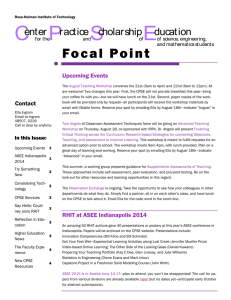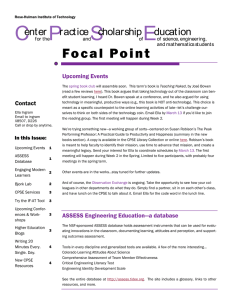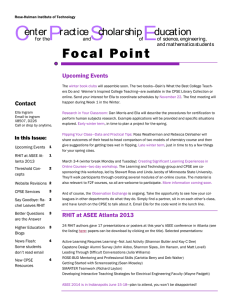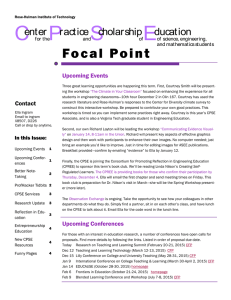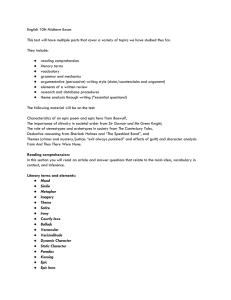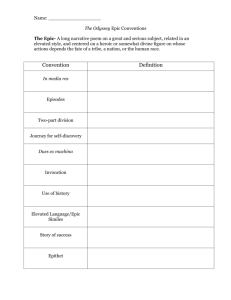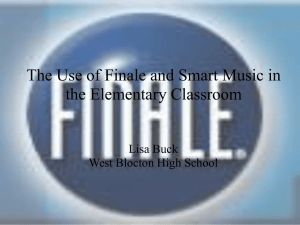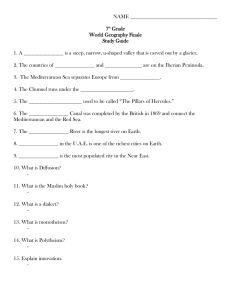C P S E
advertisement
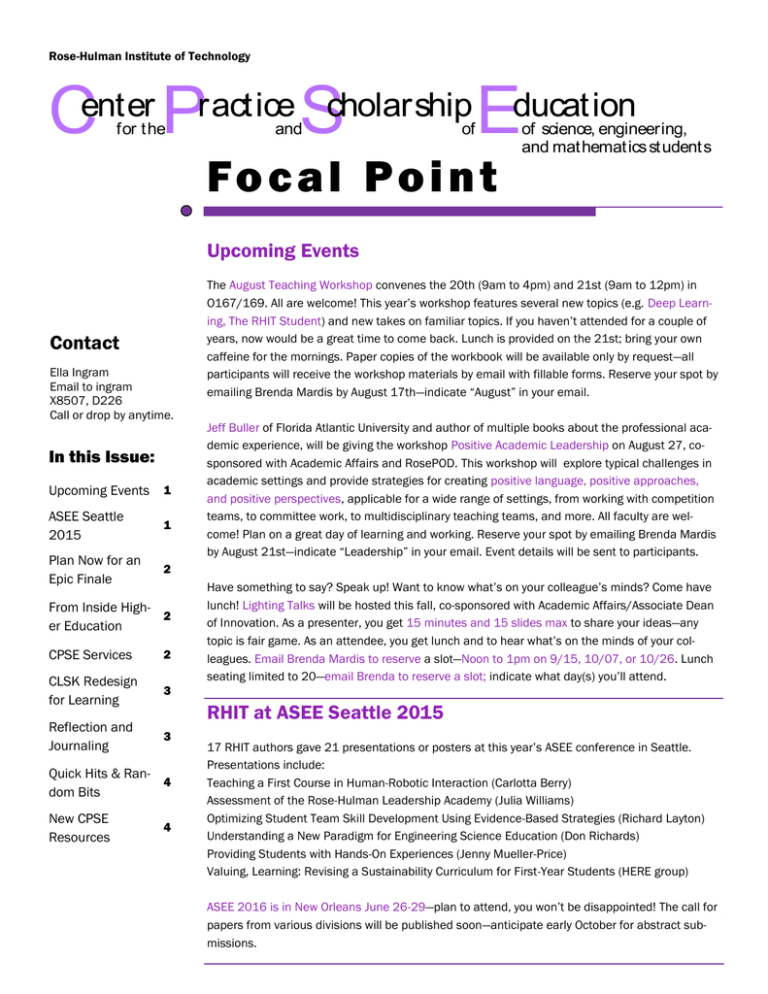
Rose-Hulman Institute of Technology Center Practice Scholarship Education for the and of Fo c a l P o i n t of science, engineering, and mathematics students Upcoming Events Contact Ella Ingram Email to ingram X8507, D226 Call or drop by anytime. In this Issue: Upcoming Events 1 ASEE Seattle 2015 1 Plan Now for an Epic Finale 2 From Inside High2 er Education CPSE Services 2 CLSK Redesign for Learning 3 Reflection and Journaling 3 Jeff Buller of Florida Atlantic University and author of multiple books about the professional academic experience, will be giving the workshop Positive Academic Leadership on August 27, cosponsored with Academic Affairs and RosePOD. This workshop will explore typical challenges in academic settings and provide strategies for creating positive language, positive approaches, and positive perspectives, applicable for a wide range of settings, from working with competition teams, to committee work, to multidisciplinary teaching teams, and more. All faculty are welcome! Plan on a great day of learning and working. Reserve your spot by emailing Brenda Mardis by August 21st—indicate “Leadership” in your email. Event details will be sent to participants. Have something to say? Speak up! Want to know what’s on your colleague’s minds? Come have lunch! Lighting Talks will be hosted this fall, co-sponsored with Academic Affairs/Associate Dean of Innovation. As a presenter, you get 15 minutes and 15 slides max to share your ideas—any topic is fair game. As an attendee, you get lunch and to hear what’s on the minds of your colleagues. Email Brenda Mardis to reserve a slot—Noon to 1pm on 9/15, 10/07, or 10/26. Lunch seating limited to 20—email Brenda to reserve a slot; indicate what day(s) you’ll attend. RHIT at ASEE Seattle 2015 Quick Hits & Ran4 dom Bits New CPSE Resources The August Teaching Workshop convenes the 20th (9am to 4pm) and 21st (9am to 12pm) in O167/169. All are welcome! This year’s workshop features several new topics (e.g. Deep Learning, The RHIT Student) and new takes on familiar topics. If you haven’t attended for a couple of years, now would be a great time to come back. Lunch is provided on the 21st; bring your own caffeine for the mornings. Paper copies of the workbook will be available only by request—all participants will receive the workshop materials by email with fillable forms. Reserve your spot by emailing Brenda Mardis by August 17th—indicate “August” in your email. 4 17 RHIT authors gave 21 presentations or posters at this year’s ASEE conference in Seattle. Presentations include: Teaching a First Course in Human-Robotic Interaction (Carlotta Berry) Assessment of the Rose-Hulman Leadership Academy (Julia Williams) Optimizing Student Team Skill Development Using Evidence-Based Strategies (Richard Layton) Understanding a New Paradigm for Engineering Science Education (Don Richards) Providing Students with Hands-On Experiences (Jenny Mueller-Price) Valuing, Learning: Revising a Sustainability Curriculum for First-Year Students (HERE group) ASEE 2016 is in New Orleans June 26-29—plan to attend, you won’t be disappointed! The call for papers from various divisions will be published soon—anticipate early October for abstract submissions. 2 Plan Now for an Epic Finale Anthony Crider posted an essay in the Chronicle of Higher Education recently (found here) describing his conversion of the final exam to the epic finale. He defines “epic finale” as the type of experience that integrates across a course, and ultimately leaves students wanting more. The epic finale, best administered, is something that students will talk about for a long time. It is necessarily collaborative, intellectually engaging, and hard to accomplish. The examples given (from his class and those of others) and the baseline guidelines caused the wheels to start turning. How about an epic finale in your class? Here are some ideas, ill-formed as they are, that might spark an epic finale idea for you. 1. Construct a “real” scenario that mimics something experienced in class examples. Thinking wildly here—bury a “victim” under a huge pile of foam pieces, meant to represent the rubble left by an earthquake. Using an understanding of forces, and with the clock ticking, can the students extract the victim with time to spare, without crushing her or causing further damage? Even better, could you simulate the earthquake itself? 2. Construct a legal case incorporating the key objectives of the course—maybe a product liability suit, with students preparing to serve in all roles—plaintiffs, defendants, expert witnesses, legal representation, jury members, and a judge. The finale is the court case. Not that the law itself is not the key point, rather having students think about how they would go about making arguments in different scenarios using highly technical information. 3. Incorporate an outside voice. The ISU speaker series is bringing to Terre Haute a former NBA All-Star, a Paralympic medalist in downhill skiing, the woman behind the voice any NPR-listener will recognize, an environmentalist and explorer, and more (see listing here—dates spread over the year). DePauw’s Ubben Lecture Series brings globally recognized speakers to Greencastle (see here). Perhaps the finale could be recreating the event in the light of course objectives and students’ newly acquired knowledge. 4. Institute a “single image” challenge: at the end of the experience, the class collectively submits a single image (constructed or found) that represents the entirety of the course objectives, with annotations, explanations, decision criteria, rejected ideas, contributions from each individual, etc. 5. Maybe even let the students construct their own epic finale… If you give this strategy a try, let your colleagues know so we can peek in on the great student thinking that will be done. CPSE Services find resources about a variety of teaching and educational research topics get help carrying out an educational research project discuss course evaluation results and plan course improvements arrange to have classes videotaped and/or peer-reviewed brainstorm ideas for projects or proposals obtain peer feedback on grant proposal or manuscript drafts Additional requests—simply email Ella at ingram@rose-hulman.edu. The Observation Exchange is ongoing. Take the opportunity to see how your colleagues in other departments do what they do. Find a partner, sit in on each other’s class, and have lunch on the CPSE to talk about it. Email Ella for the code word in the lunch line. From the Pages of Inside Higher Education Key & Peele, sketch comedians, reimagine a world of star teachers. This bit has made the rounds in recent weeks. Worth a watch, and check the BMW commercial at the end (found here). How do we get those teacher salaries??? The GradHacker blog makes some solid recommendations for improving online discussions, with key contributions in the comments (post found here). A key point is to integrate, integrate, integrate. Easier said than done! IHE advertised a survey about faculty perspectives regarding technology in the classroom. The uniformity of many of the findings are remarkable. If you have ideas about online education, browse this report (found here). 3 Introducing the New CLSK 100—College & Life Skills Guest Article by Sarah Forbes College and Life Skills (CLSK100) is a one-credit hour course taught during fall quarter. The goal of this course is to assist first-year students in acquiring skills that will facilitate a smooth transition from high school to college and will empower students to be successful at Rose-Hulman and beyond. Over the past seven months, Tom Miller, Patrick Cunningham, Sarah Forbes, Kevin Lanke, Kyle Rhodes, and Janie Szabo have focused on redesigning the course to promote better outcomes for the students as well as to increase support for the instructors. A few of the course objectives include: 1) Students will be able to proactively engage in their learning process in order to develop as an intentional, effective, and efficient learner. 2) Students will be able to develop strategies to effectively manage various aspects of their lives, including goal-setting, self-assessment of learning, time management, financial literacy, and personal and professional skills. 3) Students will be able to create and foster networks of support to use at RoseHulman and after graduation, including faculty, staff, classmates, and other academic and social resources. As a textbook, students will read The New Science of Learning by Terry Doyle and Todd Zakrajsek, to better understand how various strategies (e.g., sleep, distributed practice) impact the brain and the learning process. To enhance the importance of the lessons, Rose-Hulman faculty and students will deliver insights and expectations through videos. The new model emphasizes reflective practices as a self-regulated learning strategy. For example, students will have to engage with the resources available on campus and determine how those resources will facilitate their success. Further, the course will leverage Moodle for additional engagement with the material and as well as resources. If you have any questions about the course, please contact any member of the team. We hope to have open dialogue with the faculty in order to collaboratively support first-year students. Reflection and Journaling: Necessary Tools for Engineering Guest Article by Steve Chenoweth Necessary for learning, too! Engineers commonly become ensnared in linear problem solving, and in the group-think of their project team. They continue to believe their solution will work when, stepping back, they might quickly see that it won't. For this reason alone, they need to be practiced at seeing their tasks in a different light. These skills can be honed intentionally, via reflecting regularly on the work, in some larger context. Engineers throughout history have used journaling as a way to achieve such perspectives, continuing to add analytical entries after a project activity, as well as logging what happens as it progresses. The appended entries capture those "while away from the work" insights they would otherwise forget. College students get buried in their studies, in a similar way. They can plug-and-chug without the higher-level awareness we want them to gain from their problem solving. Being able to pull away, and critically assess what they are doing, is once again a learned solution to the problem of closeness. For engineering students, there is a double gain -- as these growing reflection skills simultaneously are applied to the students' practice of engineering work. For all students, the ability to withdraw, and analyze, furthermore enables personal growth. It lets you see yourself as an actor, performing in a way you might want to vary. Why don't we already teach this? The answer may be the same as for, "Why don't engineering teams step back to reflect on their work?" Such work feels like a diversion from the tasks at hand. Plus, you are paid to be right, and self-questioning injects doubt about that fact. Our students must feel the same way, as they drive onward, from assignment to assignment. For RoseHulman, a strategic challenge about this whole topic is, "How can we become best in class, at developing reflective skills in our undergrads?" Like, "writing across the curriculum," can we invent a "reflecting across the curriculum" plan for our students? For more ideas, contact the RHIT Consortium to promote Reflection in Engineering Education—Patrick Cunningham, Jay McCormack, and Ella Ingram, or any one of the summer learning community members (Chapman, Rogge, Forbes, Holden, Summers, Hammett, Chenoweth, Chenette, or Chenette). Events upcoming—watch Sharepoint* for announcements. *Email Ella for easy-peasy instructions for turning your Sharepoint subscription into a daily digest. All the information you need, none of the annoying email. 4 Quick Hits and Random Bits Cool stuff that doesn’t merit its own section but is too interesting to pass up… Cognitive Principles of Effective Teaching—the video series (found here) that’s a follow-up to Stephen Chew’s wonderful series How to Get the Most Out of Studying (found here). Stephen Chew, 2011 U.S. Professor of the Year, is a cognitive psychology prof as Samford University in Birmingham. The Teaching Professor Tips app (Android here, iOS here) sends a daily tip with a “nugget of wisdom” on any of a variety of topics. Free from Magna Publications (publisher of the Teaching Professor newsletter). Engineering Education Community Resource (found here) is a wiki holding links to programs, teaching center resources, events, funding opportunities, and more. Worth a browse around for those with an interest in research in teaching and learning in engineering. Interactive Knowledge Networks for Engineering Education Research (iKNEER, found here) is an NSF-funded project that attempts to illustrate the connectedness of research and knowledge. Login/registration required, leading to 100K “knowledge products”. The new open-access journal Engineering Education Letters (found here) incorporates an international focus in its aims and scope. Could be the perfect outlet for your research or perspectives. The National Center for Engineering Pathways to Innovation (found here) has voluminous resources on enhancing the entrepreneurial ecosystem on campuses (classroom games, suggested approaches, etc.). Subscribe to the newsletter, too. New CPSE Resources Blindspot: Hidden Biases of Good People. 1st edition, 2013. Mahzarin Banaji and Anthony Greenwald. Your brain deceives you on a regular bases, particularly with respect to visual stimuli. This key point is the touchstone for an exploration of other ways we have a bad sense of our perceptions. Using extensive data from cognitive psychology, the authors help the reader develop insight into our behaviors and beliefs. This book was recommended in an ASEE presentation—will be catalogued soon. Writing Across Contexts: Transfer, Composition, and Sites of Writing. 1st edition, 2014. Kathlee Yancey, Liane Roberston, and Kara Taczak. Following calls for rigorous theoretical bases in engineering education, the community produced. This work explores the specific pedagogical construct of Teaching for Transfer as a mechanism for improving written communication across disciplinary experiences. Recommended for those wanting to understand how to improve writing ability across the curriculum. Recommended (and currently being read) by Sarah Summers. Qualitative Inquire & Research Design. 3rd edition, 2012. John Creswell. Targeted at researchers (and not specifically education researchers), this foundational book addresses the common “qualitative inquiry traditions: narrative research, phenomenology, grounded theory, ethnography, and case study” (from the publisher summary). In each tradition, the mechanisms for constructing quality research are described. Specifications Grading: Restoring Rigor, Motivating Students, and Saving Faculty Time. 1st edition, 2014. Linda Nilson. The title recommends itself as a panacea to all ills. Worth a read for the possibilities it presents in completely reformulating the learning process and making faculty and students partners rather than adversaries. Search for the CPSE collection on Fusion using the acronym CPSE (or click here). You can also visit the collection in person on the first floor of the library near the Large Conference Room. Please recommend additional resources we should acquire. All unattributed material in this issue of Focal Point was written by Ella L. Ingram: ingram@rose-hulman.edu, for the Center for the Practice and Scholarship of Education, Rose-Hulman Institute of Technology, 5500 Wabash Avenue, Terre Haute, IN 47803. Contributions to issues of Focal Point are most welcome!
